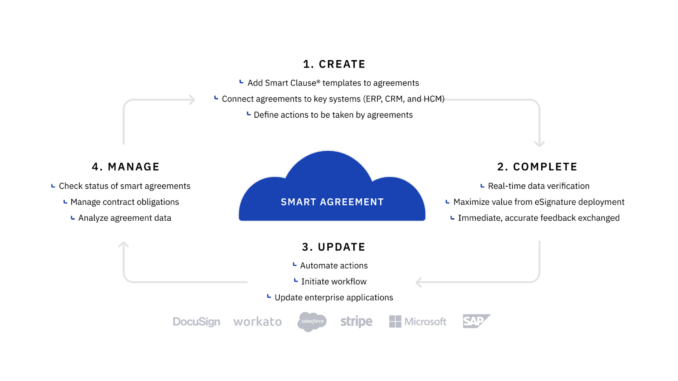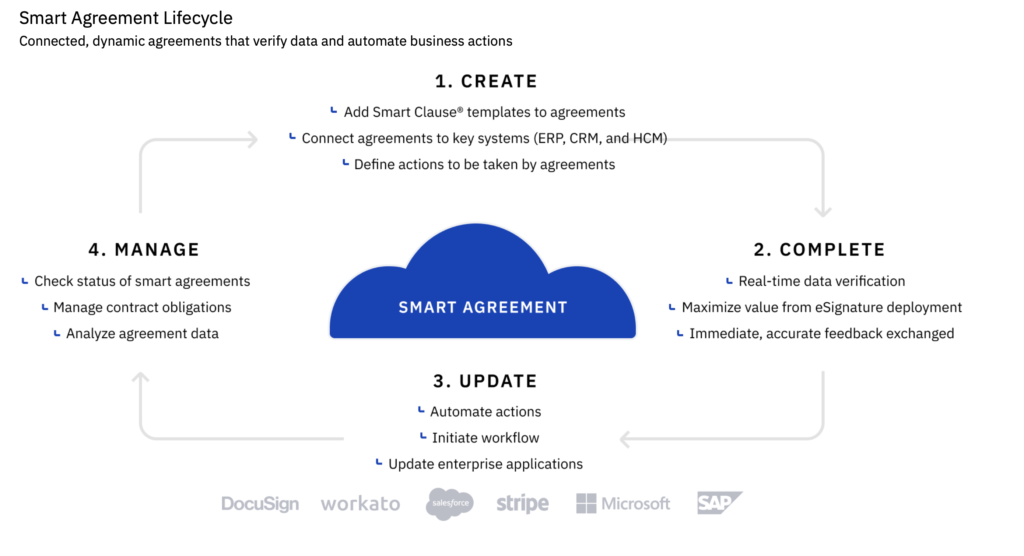
Leading esignature business, DocuSign, has set out its vision for how ‘smart agreements’ will work by combining the tech of smart contract company Clause with its ever-growing platform.
The thoughts are contained in a new white paper produced by Clause called ‘Introducing Smart Agreements’. In it Tom Gonser, Founder of DocuSign, stated: ‘At DocuSign, we pioneered the introduction of the electronic signature. This brought about a shift in the way that individuals and companies conduct transactions.
‘The Smart Clause technology pioneered by Clause is a natural extension of eSignature. Paired together, signatures can be used to trigger events and actions defined within Smart Clauses in a contract or other document.
‘This opens up a substantial array of functionality that would have otherwise required complex and costly custom solutions to implement. Adding a Smart Clause template to an agreement quickly enables it.’
Coming from the top of DocuSign this is an important statement of intent.
DocuSign is publicly listed on the NASDAQ and therefore has to be very serious about any public statements it makes that may affect investor sentiment. It is now clearly ramping up plans to get smart contract technology into a more mainstream position.
One key point that really stands out is the way that Gonser draws a direct parallel between esignatures replacing wet signatures, and smart agreements replacing static agreements. i.e. contracts that are not connected to anything.
The other key aspect is where Gonser stresses that this is not just about a company making an agreement that allows part of it, e.g. a payment authorisation clause, to be automated, but that the agreement can be hooked up, one might say, to the key data stores of the business.
‘[The goal is] to transition to an active piece of IT infrastructure, empowering the document to communicate with external resources such as data feeds, payments infrastructure, ERP, and CRM systems. This is game-changing functionality that will enable DocuSign and others to expedite the transition to smarter agreements,’ Gonser explained.
Below is an image of this vision as set out by Clause:

As seen above, this is a much broader vision than some may have expected in relation to self-executing contracts. It places the technology at the very centre of a business’s data architecture: connected to incoming data; as well as the business’s internal data stores that relate to things like CRM and ERP (enterprise resource planning) and HCM (human capital management); and then there is the connection to outward-facing systems, such as Stripe for making payments.
Is this significant? The simple answer is: yes. Smart contracts have shown plenty of promise, but real world roll-out has been slower than hoped. One reason for this is that companies have been reticent to employ a new technology without the requisite confidence that it will fit together with all their other day-to-day systems. DocuSign is a company that has already won the battle of hearts and minds for esignatures – now they want to do it for smart contracts – so that is a big boost.
Of course, even with a company as successful as DocuSign standing by your side there is no guarantee of a sudden shift in the market, although clearly this may help.
And it’s important to note, DocuSign does not own Clause and only has an investment in it. However, one can only assume that if things do work out, that DocuSign will move to acquire Clause soon enough. At present DocuSign’s annual revenues are just under $1bn, while Clause is still a startup in terms of its growth trajectory and has about 30 staff.
Also, DocuSign is no stranger to legal tech, having bought NLP pioneer, Seal Software, and integrated its tech for easier contract review, and it has also just invested in BlackBoiler, another NLP system that helps with contract review and editing.
Definition of a Smart Agreement, by Clause:
‘A smart agreement is a digital document that is connected to software systems and sources of data. Smart agreements are able to integrate and automate the performance of a contract’s legally binding obligations with enterprise software systems. On the Clause Platform, smart agreements are created by inserting a Smart Clause instance into the document in a similar way to an eSignature block.
A Smart Clause is a component of a document in programmatic form. Multiple Smart Clauses may be added to a contract and connected together. Party names, quantifiable terms, and other contract variables are rendered so that they can be connected to external data and software systems.
Doing so enables the digitization and automation of the parties’ obligations. Smart Clause templates are editable and sufficiently generic so they may be reused in different agreements, with different parties, and in different technology environments. A Smart Clause template may be added to any existing agreement alongside traditional, prose provisions.’
I’m really on the fence in regard to electronic signatures. With Covid, I see why many industries will be heading in this direction. For certain service and documents like estate planning, I wonder if you won’t see many challenges to wills and powers of attorney; especially powers of attorney. Change is coming, I just hope I’m ready for it.